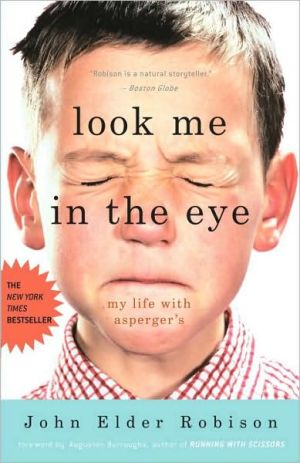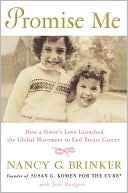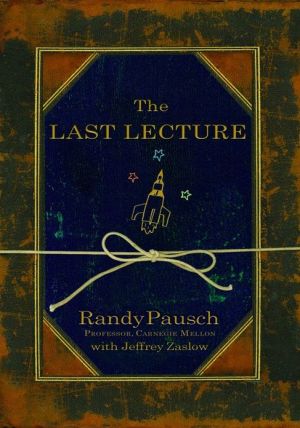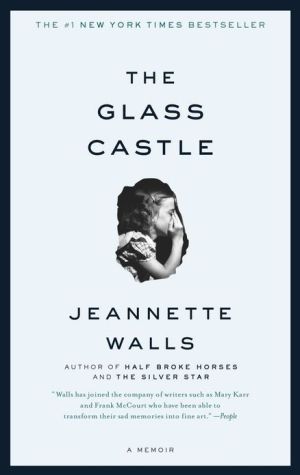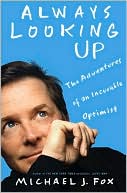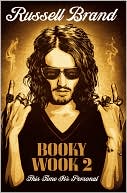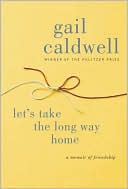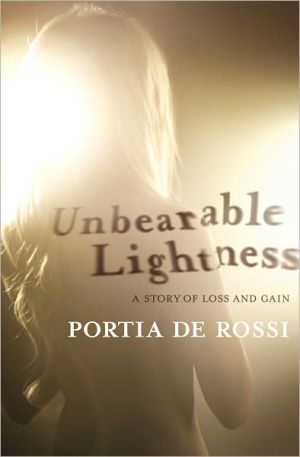Look Me in the Eye: My Life with Asperger's
New York Times Bestseller\ “As sweet and funny and sad and true and heartfelt a memoir as one could find.”\ —from the foreword by Augusten Burroughs\ Ever since he was young, John Robison longed to connect with other people, but by the time he was a teenager, his odd habits—an inclination to blurt out non sequiturs, avoid eye contact, dismantle radios, and dig five-foot holes (and stick his younger brother, Augusten Burroughs, in them)—had earned him the label “social deviant.” It was not...
Search in google:
Ever since he was small, John Robison had longed to connect with other people, but by the time he was a teenager, his odd habits an inclination to blurt out non sequiturs, avoid eye contact, dismantle radios, and dig five-foot holes (and stick his younger brother in them) had earned him the label social deviant. No guidance came from his mother, who conversed with light fixtures, or his father, who spent evenings pickling himself in sherry. It was no wonder he gravitated to machines, which could, at least, be counted on. After fleeing his parents and dropping out of high school, his savant-like ability to visualize electronic circuits landed him a gig with KISS, for whom he created their legendary fire-breathing guitars. Later, he drifted into a real job, as an engineer for a major toy company. But the higher Robison rose in the company, the more he had to pretend to be normal and do what he simply couldn t: communicate. It wasn t worth the paycheck. It was not until he w... Publishers Weekly Although this memoir deals with some dark topics-including Asperger's syndrome, family alcoholism and mental illness-debut author Robison maintains a keen humor and sense of dramatic irony throughout. The gravelly voiced Robison proves to be a capable storyteller, whether describing the pranks he used to play on his much younger brother (Augusten Burroughs, who reads his foreword) or the relief of finally being diagnosed with Asperger's in middle age after a lifetime of social isolation and relatively odd behaviors. Robison is a vocal and emphatic advocate for Asperger's, which he insists is not a disease but a different-and sometimes better-neurology. Asperger's gave Robison a single-minded ability to focus on his love of electronics, giving him a place in the world as the wizard behind Kiss's smoking and flaming guitars or, later in life, a gift for diagnosing and fixing high-end imported cars. This memoir is highly entertaining and the abridgment is smoothly edited. Simultaneous release with the Crown hardcover (Reviews, July 9). (Oct.)Copyright 2007 Reed Business Information
1\ A Little Misfit\ It was inconceivable to me that there could be more than one way to play in the dirt, but there it was. Doug couldn't get it right. And that's why I whacked him. Bang! On both ears, just like I saw on The Three Stooges. Being three years old was no excuse for disorderly play habits.\ For example, I would use my mother's kitchen spoon to scoop out a ditch. Then, I would carefully lay out a line of blue blocks. I never mixed my food, and I never mixed my blocks. Blue blocks went with blue blocks, and red blocks with red ones. But Doug would lean over and put a red block on top of the blue ones.\ Couldn't he see how wrong that was?\ After I had whacked him, I sat back down and played. Correctly.\ Sometimes, when I got frustrated with Doug, my mother would walk over and yell at me. I don't think she ever saw the terrible things he did. She just saw me whack him. I could usually ignore her, but if my father was there, too, he would get really mad and shake me, and then I would cry.\ Most of the time, I liked Doug. He was my first friend. But some of the things he did were just too much for me to handle. I would park my truck by a log, and he would kick dirt on it. Our moms would give us blocks, and he would heap his in a sloppy pile and then giggle about it. It drove me wild.\ Our playdates came to an abrupt end the following spring. Doug's father graduated from medical school and they moved far, far away to an Indian reservation in Billings, Montana. I didn't really understand that he could leave despite my wishes to the contrary. Even if he didn't know how to play correctly, he was my only regular playmate. I was sad.\ I asked my mother about him each time we went to the park, where I now played alone. "I'm sure he'll send you a postcard," my mother said, but she had a funny look on her face, and I didn't know what to make of it. It was troubling.\ I did hear the mothers whispering, but I never knew what they meant.\ ". . . drowned in an irrigation ditch . . ."\ ". . . the water was only six inches deep . . ."\ ". . . must have fallen on his face . . ."\ ". . . his mother couldn't see him, so she went outside and found him there . . ."\ What is an irrigation ditch? I wondered. All I could figure out was, they weren't talking about me. I had no idea Doug was dead until years later.\ Looking back, maybe my friendship with Doug wasn't the best omen. But at least I stopped whacking other kids. Somehow I figured out that whacking does not foster lasting friendship.\ That fall, my mother enrolled me at Philadelphia's Mulberry Tree Nursery School. It was a small building with kids' drawings on the walls and a dusty playground enclosed with a chain-link fence. It was the first place where I was thrown together with children I didn't know. It didn't go well.\ At first, I was excited. As soon as I saw the other kids, I wanted to meet them. I wanted them to like me. But they didn't. I could not figure out why. What was wrong with me? I particularly wanted to make friends with a little girl named Chuckie. She seemed to like trucks and trains, just like me. I knew we must have a lot in common.\ At recess, I walked over to Chuckie and patted her on the head. My mother had shown me how to pet my poodle on the head to make friends with him. And my mother petted me sometimes, too, especially when I couldn't sleep. So as far as I could tell, petting worked. All the dogs my mother told me to pet had wagged their tails. They liked it. I figured Chuckie would like it, too.\ Smack! She hit me!\ Startled, I ran away. That didn't work, I said to myself. Maybe I have to pet her a little longer to make friends. I can pet her with a stick so she can't smack me. But the teacher intervened.\ "John, leave Chuckie alone. We don't hit people with sticks."\ "I wasn't hitting her. I was trying to pet her."\ "People aren't dogs. You don't pet them. And you don't use sticks."\ Chuckie eyed me warily. She stayed away for the rest of the day. But I didn't give up. Maybe she likes me and doesn't know it, I thought. My mother often told me I would like things I thought I wouldn't, and sometimes she was right.\ The next day, I saw Chuckie playing in the big sandbox with a wooden truck. I knew a lot about trucks. And I knew she wasn't playing with her truck correctly. I would show her the right way. She will admire me and we will be friends, I thought. I walked over to her and took the truck away and sat down.\ "Miss Laird! John took my truck!"\ That was fast!\ "I did not! I was showing her how to play with it! She was doing it wrong!" But Miss Laird believed Chuckie, not me. She led me away and gave me a truck of my own. Chuckie didn't follow. But tomorrow was another day. Tomorrow, I would succeed in making friends.\ When tomorrow came, I had a new plan. I would talk to Chuckie. I would tell her about dinosaurs. I knew a lot about dinosaurs, because my father took me to the museum and showed me. Sometimes I had scary dreams about them, but overall, dinosaurs were the most interesting thing I knew of.\ I walked over to Chuckie and sat down.\ "I like dinosaurs. My favorite is the brontosaurus. He's really big."\ Chuckie did not respond.\ "He's really big but he just eats plants. He eats grass and trees.\ "He has a long neck and a long tail."\ Silence.\ "He's as big as a bus.\ "But an allosaurus can eat him."\ Chuckie still didn't say anything. She looked intently at the ground, where she was drawing in the sand.\ "I went to see the dinosaurs at the museum with my dad.\ "There were little dinosaurs, too.\ "I really like dinosaurs. They're neat!"\ Chuckie got up and went inside. She had completely ignored me!\ I looked down at the ground where she had been staring. What was she looking at that was so interesting? There was nothing there.\ All my attempts to make friends had failed. I was a failure. I began to cry. Alone in the corner of the playground, I sobbed and smashed the toy truck into the ground again and again and again, until my hands hurt too much to do it anymore.\ At the end of recess, I was still there, sitting by myself. Staring into the dirt. Too humiliated to face the other kids. Why don't they like me? What's wrong with me? That was where Miss Laird found me.\ "It's time to go back inside." She grabbed my little paw and towed me in. I wanted to roll up in a ball and disappear.\ Recently, one of my friends read the passage above and said, "Shit, John, you're still that way now." He's right. I am. The only real difference is that I have learned what people expect in common social situations. So I can act more normal and there's less chance I'll offend anyone. But the difference is still there, and it always will be.\ People with Asperger's or autism often lack the feelings of empathy that naturally guide most people in their interactions with others. That's why it never occurred to me that Chuckie might not respond to petting in the same way a dog would. The difference between a small person and a medium-sized dog was not really clear to me. And it never occurred to me that there might be more than one way to play with a toy truck, so I could not understand why she objected to my showing her.\ The worst of it was, my teachers and most other people saw my behavior as bad when I was actually trying to be kind. My good intentions made the rejection by Chuckie all the more painful. I'd watched my parents talk to other grown-ups and I figured I could talk to Chuckie. But I had overlooked one key thing: Successful conversations require a give and take between both people. Being Aspergian, I missed that. Totally.\ I never interacted with Chuckie again.\ I stopped trying with any of the kids. The more I was rejected, the more I hurt inside and the more I retreated.\ I had better luck dealing with grown-ups. My disjointed replies didn't bring the conversation to an abrupt halt. And I tended to listen to them more than I listened to kids, because I assumed they knew more. Grown-ups did grown-up things. They didn't play with toys, so I didn't have to show them how to play. If I tried to pet a grown-up with a stick, he'd take it away. He wouldn't humiliate me by yelling and running to the teacher. Grown-ups explained things to me, so I learned from them. Kids weren't so good at that.\ Most of the time, I played by myself, with my toys. I liked the more complex toys, especially blocks and Lincoln Logs. I still remember the taste of Lincoln Logs. When I wasn't chewing them, I made forts and houses and fences. When I got a little bigger, I got an Erector Set. I was very proud of that. I built my first machines with the Erector Set.\ Machines were never mean to me. They challenged me when I tried to figure them out. They never tricked me, and they never hurt my feelings. I was in charge of the machines. I liked that. I felt safe around them. I also felt safe around animals, most of the time. I petted other people's dogs when we went to the park. When I got my poodle, I made friends with him, too.\ "Look what your grandpa Jack sent you, John Elder!" (My parents named me John Elder Robison to honor my great-grandpa John Glenn Elder, who died before I was born.) My dad had brought home a wooly, ill-tempered, and probably genetically defective dog, most likely a reject from some dog pound. But I didn't know that. I was fascinated. He growled at me and wet the floor when my father put him down.\ I wasn't scared of him, because he was considerably smaller than me. I had not yet learned that sharp teeth can come in small packages.\ "Poodles are very smart dogs," my father told me.\ Maybe he was smart, but he wasn't very friendly. I named him Poodle, beginning a long tradition of functional pet naming. I didn't really know what to do with a dog, and I was always squeezing him and grabbing his tail and yanking in an effort to figure that out. He bit me whenever I yanked too hard. Sometimes he bit hard enough to make my arms bleed, and I would cry. Years later, I told that story to my mother, who said, "John Elder, Poodle never bit you hard enough to make your arms bleed! If he had, that would have been the end of Poodle in our house." All I could say to that was "Little bites are a big deal to little people." And that's how I remember it.\ Once, I locked him in my room and he got out. He chewed a dog-sized hole in the bedroom door. We found him lying in the sun in the backyard.\ Seeing that, I tried chewing the door myself. My teeth barely made a dent in the paint. I didn't even manage to bite a splinter out of the wood. I realized that Poodle had very sharp teeth. I learned to put my toys away before I went to bed every night. If I forgot, Poodle would come in during the night and eat them.\ My parents didn't like Poodle because he ate their furniture. Despite that, Poodle and I slowly became friends. I was always a little wary of him, though, because I never knew what he'd do.\ Our home wasn't very happy. The dog ate my toys and snapped, and my parents always fought. One night, I awoke to them yelling at each other in the next room. They often fought at night when they thought I was asleep. It was always stressful and unsettling to me, but this time was different. My mother was crying in addition to yelling. She didn't usually cry.\ "Momma!" I yelled loud to make sure she heard me.\ "It's okay, John Elder, go to sleep." She came in and patted me on the head, but she went right back out.\ I didn't like that at all. Usually, she sat with me, and petted me, and sang to me till I fell asleep. Where did she go? What's going on?\ The loud fights were disturbing because I was sure they were fighting about me, and I knew if they got tired of me they could just leave me somewhere to fend for myself. I thought, I have to be really good, so they won't get rid of me.\ So I tried to be very quiet and act asleep. I figured that's what they expected.\ "He'll go back to sleep," my mother said, quietly. Hearing that, I was wide awake, and even more scared.\ "No, he won't," my father cried. "He'll remember this night when he's forty." And then he started sobbing, too. Anything that made both of them cry must be very, very bad.\ "Daddy! Don't make Momma cry!" I could not help myself. I wanted to hide under the bed but I knew they'd find me. I was terrified.\ My mother came back in and sang softly to me, but she sounded funny. After a few minutes, though, I fell into a troubled sleep.\ Much later, I learned that my father had been having an affair with a secretary from the German department at the university where he was studying. My mother told me she looked just like her. I guess the affair unraveled that night, and my parents' marriage unraveled some more, too. That was when my father started to turn mean.\ When I woke up the next morning, he was still in bed. He wasn't at school. "Your father is tired," my mother said. "He's resting." I walked over to him. He smelled normal, and he was snoring. I left him alone and my mother walked me to school like she always did.
Author's Note ixForeword Augusten Burroughs xiPrologue 1A Little Misfit 7A Permanent Playmate 19Empathy 29A Trickster Is Born 35I Find a Porsche 43The Nightmare Years 51Assembly Required 59The Dogs Begin to Fear Me 69I Drop Out of High School 85Collecting the Trash 95The Flaming Washtub 101I'm in Prison with the Band 113The Big Time 125The First Smoking Guitar 133The Ferry to Detroit 143One with the Machine 151Rock and Roll All Night 155A Real Job 171A Visit from Management 181Logic vs. Small Talk 189Being Young Executives 195Becoming Normal 207I Get a Bear Cub 219A Diagnosis at Forty 233Montagoonians 241Units One Through Three 247Married Life 253Winning at Basketball 259My Life as a Train 265Epilogue 273Acknowledgments 283Reading and Resources 285
\ From Barnes & NobleEven without medical diagnoses, John Elder Robison's youth was abnormal. His father was an abusive alcoholic; his mother was deeply mentally disturbed. Not surprisingly, John's grades foundered. Teachers and classmates were puzzled by his detachment and odd, almost mechanical responses. However atypical, Robison's behavior had a significant upside: he was exceptionally proficient with machines, circuits, and other systems. At the time, however, nobody recognized that he had Asperger's syndrome, a still controversial condition on the autistic spectrum. In fact, it was not until he was 40 that Robison was properly diagnosed. This unconventional, sometimes hilarious memoir reveals Asperger's as a fascinating human condition, not a horrifying psychological malady.\ \ \ \ \ From the Publisher"Deeply felt and often darkly funny, Look Me in the Eye is a delight."\ —People magazine, Critics Choice, 4 Stars\ “It's a fantastic life story (highlights include building guitars for KISS) told with grace, humor, and a bracing lack of sentimentality.”\ —Entertainment Weekly\ “Dramatic and revealing.”\ —Boston Globe\ “Lean, powerful in its descriptive accuracy and engaging in its understated humor...Emotionally gripping.”\ —Chicago Tribune\ “Robison’s lack of finesse with language is not only forgivable, but an asset to his story . . . His rigid sentences are arguably more telling of his condition than if he had created the most graceful prose this side of Proust.”\ —Chicago Sun-Times\ “Look Me in the Eye is a fantastic read that takes readers into the mind of an Aspergian both through its plot and through the calm, logical style in which Robison writes. . . Even if you have no personal connections with Asperger’s, you’ll find that Robison—like his brother, Burroughs—has a life worth reading about.”\ —Daily Camera\ “Not only does Robison share with his famous brother, Augusten Burroughs (Running With Scissors), a talent for writing; he also has that same deadpan, biting humor that's so irresistible.”\ —ELLE magazine\ “There's an endearing quality to Robison and his story that transcends the "Scissors" connection … Look Me in the Eye is often drolly funny and seldom angry or self-pitying. Even when describing his fear that he'd grow up to be a sociopathic killer, Robison brings a light touch to what could be construed as dark subject matter…Robison is also a natural storyteller and engaging conversationalist.”\ —The Boston Globe\ “This is no misery memoir…[Robison] is a gifted storyteller with a deadpan sense of humour and the book is a rollicking read.\ —Times (London)\ “Robison's memoir is must reading for its unblinking (as only an Aspergian can) glimpse into the life of a person who had to wait decades for the medical community to catch up with him.”\ —Booklist\ “Well-written and fascinating.” —Library Journal\ “Thoughtful and thoroughly memorable…Moving…In the end, Robison succeeds in his goal of “helping those who are struggling to grow up or live with Asperger’s” to see how it “is not a disease” but “a way of being” that needs no cure except understanding and encouragement from others.”\ —Publishers Weekly\ “Affecting, on occasion surprisingly comic memoir about growing up with Asperger’s syndrome….The view from inside this little-understood disorder offers both cold comfort and real hope, which makes it an exceptionally useful contribution to the literature.\ —Kirkus Reviews\ \ “Of course this book is brilliant; my big brother wrote it. But even if it hadn’t been created by my big, lumbering, swearing, unshaven ‘early man’ sibling, this is as sweet and funny and sad and true and heartfelt a memoir as one could find, utterly unspoiled, uninfluenced, and original.”\ —from the foreword by Augusten Burroughs, author of Running with Scissors\ “Look Me In The Eye is a wonderful surprise on so many levels: it is compassionate, funny, and deeply insightful. By the end, I realized my vision of the world had undergone a slight but permanent alteration; I had taken for granted that our behavioral conventions were meaningful, when in fact they are arbitrary. That he is able to illuminate something so simple (but hidden, and unalterable) proves that John Elder Robison is at least as good a writer as he is an engineer, if not better.”\ —Haven Kimmel (who was in attendance at the 1978 KISS tour*), author of A Girl Named Zippy\ “I hugely enjoyed reading Look Me in the Eye. This book is a wild rollercoaster ride through John Robison’s life—from troubled teenage prankster to successful employment in electronics, music, and classic cars. A kindly professor introduced him to electrical engineering, which led to jobs where he found techie soulmates that were like him. A fascinating glimpse into the mind of an engineer which should be on the reading list of anyone who is interested in the human mind.”\ —Temple Grandin, author of Thinking in Pictures and Animals in Translation\ “John Robison's book is an immensely affecting account of a life lived according to his gifts rather than his limitations. His story provides ample evidence for my belief that individuals on the autistic spectrum are just as capable of rich and productive lives as anyone else.”\ —Daniel Tammet, author of Born on a Blue Day: Inside the Extraordinary Mind of an Autistic Savant\ \ \ \ Publishers WeeklyAlthough this memoir deals with some dark topics-including Asperger's syndrome, family alcoholism and mental illness-debut author Robison maintains a keen humor and sense of dramatic irony throughout. The gravelly voiced Robison proves to be a capable storyteller, whether describing the pranks he used to play on his much younger brother (Augusten Burroughs, who reads his foreword) or the relief of finally being diagnosed with Asperger's in middle age after a lifetime of social isolation and relatively odd behaviors. Robison is a vocal and emphatic advocate for Asperger's, which he insists is not a disease but a different-and sometimes better-neurology. Asperger's gave Robison a single-minded ability to focus on his love of electronics, giving him a place in the world as the wizard behind Kiss's smoking and flaming guitars or, later in life, a gift for diagnosing and fixing high-end imported cars. This memoir is highly entertaining and the abridgment is smoothly edited. Simultaneous release with the Crown hardcover (Reviews, July 9). (Oct.)\ Copyright 2007 Reed Business Information\ \ \ \ \ Library JournalFirst-time writer Robison diagnosed himself with Asperger's syndrome after receiving Tony Attwood's groundbreaking work on the subject from a therapist friend ten years ago. In his well-written and fascinating memoir, the fifty-something brother of Augusten Burroughs (Running with Scissors) addresses the difficultly of growing up in a household with an abusive and alcoholic father, the social problems he encountered at school, and his great affinity for mechanics. It made no difference that he lacked a high school diploma-Robison's natural skills landed him work as an automobile restorer, Milton Bradley engineer, and stagehand responsible for the pyrotechnic guitars used by rock band KISS in the late 1970s. Despite these successes, the author suffered social difficulties while developing his ability to connect with and understand machines, a thread that is explored in great detail. If there is a drawback here, it is that readers do not get a strong sense of how his self-diagnosis impacted his life. But even among the growing number of books written by those diagnosed later in life, this entry is easily recommended for public and academic libraries with autism collections. [See Prepub Alert, LJ5/15/07.]\ —Corey Seeman\ \ \ \ \ \ Kirkus ReviewsAffecting, on occasion surprisingly comic memoir about growing up with Asperger's syndrome. Those who have this autism spectrum disorder are often seen as weird, because of their odd mannerisms and expressions and their difficulties in talking to other people. But Asperger's may also confer rare talents, such as the ability to focus intently and to think rapidly and creatively, notes the author, who wrote this text at the urging of younger brother Augusten Burroughs (Running with Scissors, 2002, etc.). A social misfit helped not at all by a battery of therapists, Robison admits that his behavior was decidedly disturbing, sometimes foolish and often dangerous. Asperger's can lead to a life of isolation, but the author credits interested adults with drawing him out as a child and keeping him engaged with human beings. He dropped out of high school at age 15 and left home at 16, impelled by a troubled family situation (alcoholic father, mentally disturbed mother) into the working world. While people were a mystery to him, machines were not. He became a self-taught sound engineer for rock bands and later a designer of electronic toys. The discovery at age 40 that his strangeness had a name altered Robison's view of himself, giving him a new confidence and enabling him to find more acceptable ways of coping with other people. He has learned to look them in the eye and even make small talk. His essays on choosing a wife and on naming people (he calls his spouse Unit Two, because she's a middle sister) suggest that the prankster in him still lives, but they also demonstrate the oddness of the Asperger's mind. Chapters on his son and on his late discovery of friendship are truly moving. The viewfrom inside this little-understood disorder offers both cold comfort and real hope, which makes it an exceptionally useful contribution to the literature.\ \
